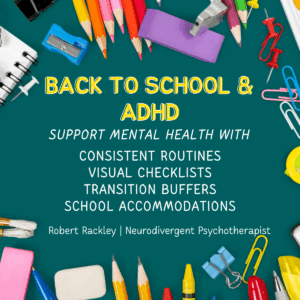Back to School with ADHD: Strategies for Routines, Accommodations, and Mental Health
September often marks a fresh start — new books, new teachers, new uniforms. But for many neurodivergent children and their families, back to school is also a time of heightened stress and mental health challenges.
Crowded classrooms, noisy hallways, and shifting routines can quickly become overwhelming. Parents who are neurodivergent themselves may feel the pressure doubly — managing their own executive functioning struggles while supporting their child through the transition.
That’s why ADHD back to school strategies matter. They don’t just support organisation — they protect mental health.
Why Back to School Can Be Hard for ADHD
For children with ADHD, the school environment can be exhausting. Transitions are difficult, and unexpected changes in routine may trigger anxiety. Parents with ADHD often describe September as a juggling act — handling forms, uniforms, and new schedules while battling their own executive functioning challenges.
Without the right supports in place, stress builds quickly, and both children and parents may feel burned out before the term has truly begun.
ADHD Back to School Strategies: The Power of Routine
Routines provide structure and predictability — two things that help reduce anxiety and overwhelm.
Some practical strategies include:
Consistent mornings and evenings: predictable routines create a sense of safety.
Visual checklists: lighten the working memory load for both children and parents.
Transition buffers: a few minutes of quiet time before and after school allow the nervous system to reset.
When routines are reliable but flexible, children feel grounded, and parents feel less overwhelmed.
ADHD and School Accommodations That Protect Mental Health
While routines are vital, they aren’t always enough. Many children also need school accommodations to truly thrive.
Accommodations are not “special treatment.” They are how neurodivergent students access education on equal terms with their peers. Examples include:
Extra time in exams and assignments
Reduced homework load
Access to sensory tools or quiet spaces
Flexible seating or movement breaks
These supports do more than improve academic outcomes. They protect a child’s mental health and self-esteem. Without accommodations, school can become a cycle of stress and shame.
Building a Stronger Start: Routine + Accommodations
When routines and accommodations work together, September feels different.
Children feel safer.
Parents feel more supported.
Mental health is protected.
ADHD back to school strategies don’t have to be complicated. Sometimes, the simplest supports — like clear routines and well-chosen accommodations — create the biggest impact.
Back to school can be a stronger start, not a source of burnout.
About the Author
I’m Robert Rackley MSc MIACP, The Neurodivergent Psychotherapist. I provide specialist counselling for neurodivergent adults and psychoeducation for adolescents. I also deliver CPD-accredited training to therapists and organisations on supporting neurodivergent clients.
📍 Based in Limerick | Online & In-Person Therapy Available

